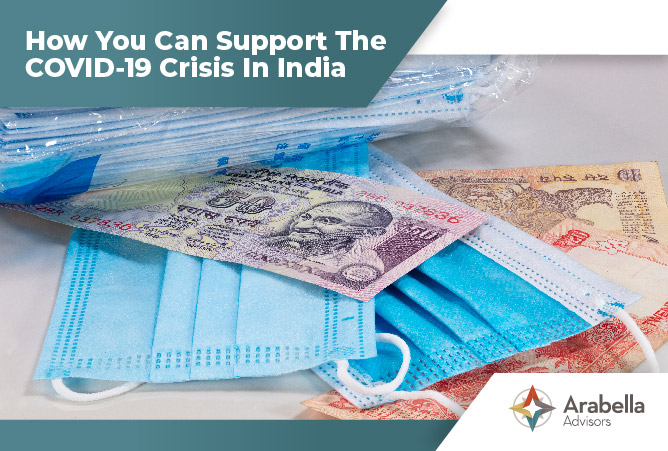How You Can Support COVID-19 Crisis In India

As COVID-19 continues to ravage India, many of you here in the United States have asked how you can show support and solidarity. In the spirit of addressing the current crisis, as well as thinking through longer term support, I wanted to share some perspectives as to how you might help.
1. Acknowledge the crisis. All of your South Asian colleagues are impacted by this crisis. The Indian diaspora in the United States is 4 million people strong. Many of us are first-generation immigrants and have extended family and friends in India. As you see fit, ask your colleagues how they and their loved ones are faring.
2. Create space and support. Understand that your colleagues may frantically be trying to get needed information from, and required resources to, their relatives on the ground. They are trying to do this navigating varying time zones, languages, and internet connectivity barriers. Realize that they may not be able to perform, show up, or be present at this moment in the way you need (or perhaps, in the way they desire to perform.) If you’re a supervisor, think about the various types of leave that can be used. For some, work may be a welcome distraction from the current situation. For others, just the opposite. No one size will fit all. Recognize that we are in the beginning of a surge, so space may be needed in the coming weeks as well.
3. Recognize cultural and religious differences. Funeral rites vary by community, caste, religion, and tradition, but they are all being disrupted in this current moment, which creates additional grief and feelings of helplessness.
4. Consider supporting local non-profits (recognizing that not all donations may qualify for US tax deductions.) Like the United States, India is a large, federated system, and health-care provision, rules, and norms vary by state. Local nonprofits have existing relationships with communities and are likely to be able to manage near-term logistics and supply chains quickly. Consider targeted responses to regions in acute need, knowing that these needs might change as the crisis unfolds. A few organizations on the ground recommended by Indiaspora:
· Swasth| Mumbai – Delivering quality healthcare in Mumbai slums since 2009, provides funding to operate a 150+ patient COVID care center, deliver medicines and supplies to health-care workers, and provide home care to mild COVID cases to help prevent overburdening of hospitals.
· SaveLIFE Foundation | Delhi – Leveraging its expertise in emergency medical response, first responder training and data analytics since 2008, provides funding for the purchase and distribution of oxygen concentrators to Delhi hospitals.
· SWASTI | Bangalore – Creating a network of 300+ organizations and 2,000 volunteers to launch COVIDActionCollab (CAC), provides funding to test communities for comorbidities, telecare for patients, and COVID care centers.
· Aajeevika Bureau | Gujarat – Supporting migrant workers since 2004, provides funding for medical emergency support, food and nutrition, and greater rights from their employers for dignity and equity.
· Goonj | Pan India – Working since 1999 on development and disaster relief, provides funding for oxygen, medicine, food and ration kits across its pan-India network of communities from urban to village.
5. Maximize Corporate and Foundation Match Programs. Your company may be able to match your contribution to a US-based charity. You may also want to consider some of these organizations who are currently matching funds and/or have US charitable status:
· The Desai Foundation: Established in 1997, this is a family foundation that serves and empowers local communities in India, especially women and children. Their special COVID-19 relief fund seeks to raise $250,000 in the next two weeks, and all gifts will be matched by the foundation 100 percent. Funds will be immediately passed along to program partners doing urgent work to combat COVID-19, especially to support community-based health, medical needs, and women. This organization has U.S. 501c3 status. You can also make gifts that are tax deductible in India through The Desai Foundation Trust.
· Give India: Established in 2000, this is India’s largest donation platform, backed by well-known philanthropists and with a goal of channeling charitable resources to vetted NGOs in India. Their COVID-19 campaign is focused on immediate response to fight this second, deadly wave, especially to provide oxygen, food, and sanitary supplies to the most vulnerable. Donations are tax deductible in India (80G) and the U.S. (501c3). You can start your own COVID-19 fundraiser on their platform.
· The American-India Foundation: Established in 2001 following the Gujarat earthquake, this is a US nonprofit that focuses on catalyzing social and economic change for the most underserved in India. They have recently launched phase 2 of their COVID-19 response. Donations may be made in US dollars or Indian rupees and are tax deductible in the United States.
6. Remember the Long Game. As with any crisis, donors respond in the moment but may, at times, forget the need to build resiliency over the longer term. Disaster recovery is the “process of improving individual, family and community resiliency after the occurrence of a disaster,” according to the Center for Disaster Philanthropy. They will share their wisdom in an upcoming webinar: “Funding COVID-19 Response in India: How an Urgent Crisis Affects Us All.
I welcome the perspectives and ideas of others as we work to confront this crisis.
